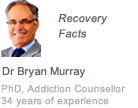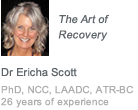Effects of Alcohol
You could ask any number of people what the effects of alcohol are, and the chances are that you will hear the same kind of response time after time:
“It gets you drunk.”
“It relaxes you.”
“It makes you happy.”
“It helps you to unwind.”
“It gets the party started.”
It is true that alcohol can achieve all of these things. It can achieve other things too, but you are less likely to hear responses along the lines of:
“It makes me violent.”
“It makes me cry.”
“It causes me to black out.”
“It cost me my job.”
“It cost me my family.”
These things can also be considered to be common effects of alcohol. But they belong to the darker side of alcohol, the hidden side, the side we do not talk about openly.
Perhaps the most potent effect of alcohol is that it produces within us senses of wellbeing, happiness, fun and sociability. Alcohol rewards us with these feelings and creates enduring associations with good times, or life’s celebrations, to the extent that we return to it every time that we want to recreate these relaxed and pleasurable feelings.
The positive associations of the effects of alcohol are actively reinforced by marketing, advertising and sponsorship. Champagne, cognac and vintage whiskies are used to signify high social standing; lager, beer and cider represent the drinks of choice for a happy and sociable night out with the lads.
We never see an advertisement for an alcoholic drink which depicts the commonly-incurred but unpleasant hangover, the detrimental effects on our health and well-being or worse still, the possibility of descent into alcohol dependency. As a society, when we talk about the effects of alcohol there is a tendency to “accentuate the positive and eliminate the negative”.
Perhaps it is time we took a closer look at the true effects of alcohol.
The short term effects of alcohol
However attractively it is presented to us, and in whichever guise, alcohol is at heart a sedative. In order to provide us with that relaxed feeling and those lowered inhibitions, alcohol suppresses the normal activities of our central nervous system.
Initially, these effects of alcohol are not a problem as long as we drink responsibly and respect our individual limits. But let us imagine that you possess an average tolerance for alcohol, and you are spending the evening at a social gathering (such as a stag night) where you are likely to be drinking alcohol continuously over a period of several hours.
Let us look at the short term effects of alcohol as our imaginary evening passes and your alcohol consumption increases.
- Over the first few drinks, everything is fine and the world is a fun place. Your mood is buoyant, you are confident and sociable – perhaps noticeably more so than usual.
- You’ve had a few more drinks, and your inhibitions are suppressed to the extent that your behavior might be described as ‘loud’ or ‘boisterous’. Dilation of the blood vessels is beginning to occur, giving you a ‘flushed’ complexion. The fact that your physical and mental judgment may be slightly impaired is compensated for by the accompanying feeling of euphoria.
- It is later in the evening, but your misjudged desire to retain social inclusion means that you have continued drinking beyond your normal capacity for alcohol tolerance. Drowsiness has replaced euphoria, your reactions are delayed and your senses, particularly your vision, may be impaired. Your sense of balance has been affected; coordinated walking requires concentration.
- The evening is drawing towards an end. Your mental confusion and incoherent speech renders you incapable of refusing the further drinks that are placed before you; you are drinking on autopilot. The ability to walk has been replaced by an uncoordinated stagger, but the act of standing up results in a nausea-inducing dizziness – the room has an unsettling tendency to spin around you. You are entirely unable to control outbursts of emotion: particularly spontaneous crying.
- We have reached the end of a long night’s drinking. Thanks to a final couple of drinks you are floating in and out of consciousness. Despite vomiting copiously your level of intoxication has not outwardly decreased. Your bladder has involuntarily emptied itself. Your heart rate has slowed and your breathing is shallow. To ingest further alcohol at this point invites the risk of coma, or death by alcohol poisoning.
Although the tolerance of alcohol varies from person to person, the illustration approximates the short-term effects of alcohol as ingestion increases beyond normal limitations. For those who may suffer an addiction to alcohol, this is the reality that underlies the pleasurable, glamorous and attractive image of alcohol.
The long term effects of alcohol
The major long term effects of alcohol have been widely publicized. It is no secret that the person who habitually drinks alcohol excessively over an extended period is potentially exposed to harmful and possibly fatal conditions such as liver cirrhosis, heart disease, cancer and strokes.
The importance of highlighting these conditions as the most serious and dangerous long term effects of alcohol cannot be overemphasized, but it should be recognized that there are a great many more undesirable and potentially harmful long term effects arising from the prolonged consumption of alcohol.
Whilst not exhaustive the list of long term effects of alcohol, both physical and psychological, includes:
- The dilation and bursting of blood capillaries, particularly in the face, leading to the distinctive red complexion and bloodshot eyes of the habitual drinker
- The increased likelihood of diabetes
- Increased weight, due to alcohol’s high calorific value
- Sexual dysfunction including impotence and infertility
- Depression
- Hypertension
- Stomach ulcers
- Delirium Tremens (the ‘DT’s’ or ‘shakes’)
Of course, these are just the long term effects of alcohol on the drinker. We must not forget that there may be equally harmful physical and psychological consequences for the family and friends of the habitual user of alcohol.
Recovering from the effects of alcohol
The effects of alcohol, particularly the long term effects, are generally considered to be the result of a dependence upon alcohol. Alcohol dependence is an illness, not a weakness. It is an illness that can be treated and that can be recovered from.
The first step to getting help for yourself, or for someone in whom you recognize the effects of alcohol dependency, is to cast aside blame. Each of us is vulnerable in some way; it is one of the definitions of our humanity. For the alcohol dependent person, we must acknowledge and accept that a combination of personal circumstances has resulted in the need to seek solace in alcohol. Demonise the drink, but not the drinker.
The effects of alcohol, both short and long-term can be devastating. It is not too late to prevent yourself or someone close to you from becoming just another statistic in the death-by-alcohol file. Alcohol dependency can be beaten if you do not leave it too late to get professional help.












